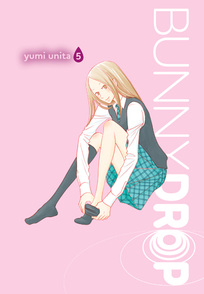Review
by Rebecca Silverman,Bunny Drop
GN 5
| Synopsis: |  |
||
Ten years have come and gone and Rin is now a high school student. Her relationship with Kouki is changing, or rather, it's trying to, and Rin isn't quite sure how she wants to handle that. Daikichi, meanwhile, is still working hard trying to provide for his adopted daughter to the exclusion of nearly all else. |
|||
| Review: | |||
Take up your comment shields and swords, ladies and gentlemen, the time skip has landed. Ten years have passed since the end of volume four, and Rin, as seen on the cover, is now a girl in her mid-teens. She has taken over most of the household chores, such as cooking and laundry, somewhat to Daikichi's consternation, and seems the very definition of a mature young lady. She's still close with Kouki and Reina, who appear to make up the entirety of her social circle, and has evolved from a cute, precocious child to a put-together teen. Wait, haven't we read about mature, with-it teenage girls before in other series? Aren't we familiar with the adopted child who feels she must make it up to her benefactors, no matter what? And can anyone name a series without a childhood friend who has love interest potential? While none of these are egregious sins even in josei manga (as opposed to shoujo with a high school setting), they are a come down in what has hitherto been a sweet story about the troubles of single parenthood. Daikichi takes a definite backseat to Rin, and unfortunately that makes the series decidedly less interesting. Simply put, we've read about Rin before, whereas Daikichi was a new experience. The majority of this volume focuses on Rin and her relationship with Kouki. Despite some rough times during the middle school years, the two are such an inseparable pair that everyone assumes a different type of liason than they actually have. Kouki has grown up to be much more emotive than Rin, and he makes his thoughts on the subject abundantly clear, while Rin plays her cards close to the chest. In fact, she even hides her true thoughts from Reina (the bratty cousin who has grown up to be a spacy teen), only really confiding in Daikichi. This is the only real glimpse of their relationship that we see – yes, Rin jibes him about not being more responsible in terms of waking up on time, but Daikichi is largely absent from these pages, making his one heart-to-heart with Rin appear more significant than it perhaps is. We get very few of his inner thoughts, lending him a much more cardboard parent-figure air than previous volumes gave him, once again contributing to the decreased interest of this book. Perhaps the most interesting chapter, it would follow, is the final one, which shifts the series focus back to Daikichi and his various issues. The theme of the chapter is lost opportunities and why a certain event has not happened in the ten years we as readers were not privy to. The hints and flashbacks are enough to make the despairing reader wish that this volume had skipped fewer years ahead so that we might have had the chance to watch Daikichi reach the point he is at in this chapter. It certainly would have felt more in keeping with the tenor of the series' first four volumes, which is actually this book's biggest fault – it is simply not the same kind of story that we were reading up to this point. And maybe by denigrating the series for that fact we overlook Unita's vision for it, or at least a point she was looking to make. Things DO change, life doesn't go the way we anticipate it, and fiction that acknowledges the more serious side of that in a gentle way is not especially common. So it may not be fair to look at the series as a whole being in a downward spiral simply because this volume came as a surprise in terms of plot and, more importantly, point of view character. Overall, however, Bunny Drop's fifth volume, while it still has its merits like clean, albeit not traditionally attractive, artwork and a plot with disguised complexity beneath its simple surface, is just not quite as good as its predecessors. The quirky, not-the-norm parenting story has, at least for the moment, stepped aside for a more typical tale of teen issues, and while some of those are directly related to being raised by single parents (something all three kids are well aware of, which gives us some tantalizing hints and, therefore, hope for later books), they are just not as engaging as the earlier storyline. Let us hope that this volume, the exact middle of the series, is simply a bump in the road and needed set up for where Unita is going next, because it would be a shame to see so charming and thoughtful a series jump the proverbial shark. |
| Grade: | |||
|
Overall : B-
Story : C+
Art : B-
+ New character designs make it easy to recognize how child became teen, some promising potential in the younger characters' awareness of their own issues. |
|||
| discuss this in the forum (18 posts) | | |||
| Production Info: | ||
|
Full encyclopedia details about Release information about |
||